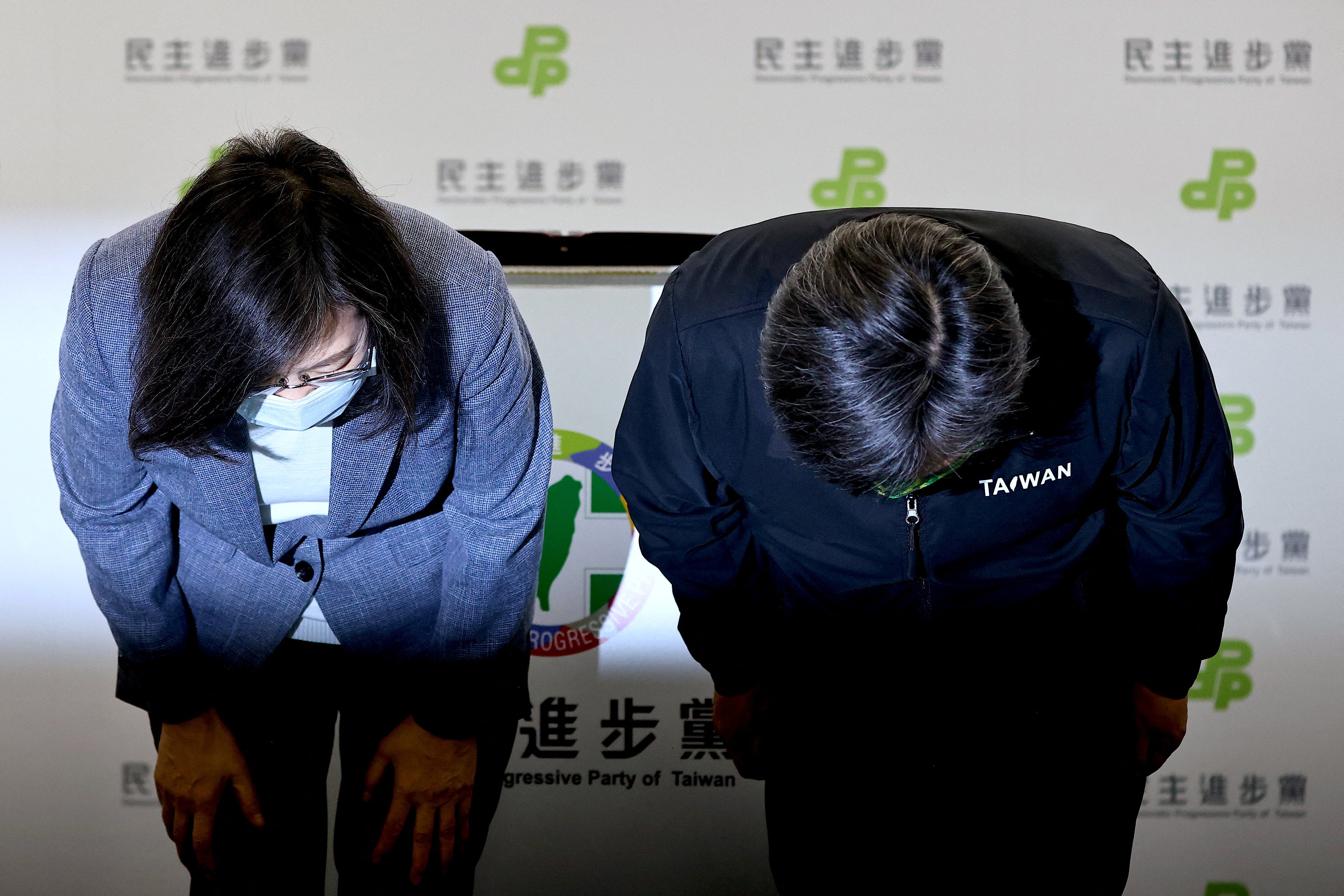Taiwan election: President Tsai Ing-wen resigns as ruling party chair after disastrous results
Taiwan’s ruling party lost 13 of the total 21 seats in local polls to appoint mayors, councillors and magistrates in several counties
Your support helps us to tell the story
From reproductive rights to climate change to Big Tech, The Independent is on the ground when the story is developing. Whether it's investigating the financials of Elon Musk's pro-Trump PAC or producing our latest documentary, 'The A Word', which shines a light on the American women fighting for reproductive rights, we know how important it is to parse out the facts from the messaging.
At such a critical moment in US history, we need reporters on the ground. Your donation allows us to keep sending journalists to speak to both sides of the story.
The Independent is trusted by Americans across the entire political spectrum. And unlike many other quality news outlets, we choose not to lock Americans out of our reporting and analysis with paywalls. We believe quality journalism should be available to everyone, paid for by those who can afford it.
Your support makes all the difference.Taiwan’s ruling party’s leader Tsai Ing-wen tendered her resignation as the ruling Democratic Progressive Party’s chair on Saturday after facing a humiliating defeat against the opposition Kuomintang (KMT) party in local elections.
Ms Tsai’s party lost 13 of the total 21 seats up for grabs to the KMT, the oldest political party in Taiwan, despite a full-throated campaign, with analysts suggesting that her efforts to focus the election on China issues backfired among voters.
The Taiwanese president said she humbly accepts and must shoulder responsibility for the party’s disappointing election results as she addressed reporters at the DPP headquarters.
The DPP had campaigned on sending a strong message to the world about Taiwan’s ability to protect its democracy in a local election which would normally focus on more domestic issues like Covid-19 infections and local crime rates.
Taiwanese premier Su Tseng-chang also resigned but Ms Tsai said she has asked him to hold on to the post to ensure that the administration’s major policies are not hindered.
She also blamed the election defeat on the party’s failure to change the political situation at the local government level and not meeting the expectations of citizens.
Her party’s rival and Taiwan’s main opposition party – the KMT – turned to younger candidates, including the grandson of former Chinese president Chiang Kai-shek, Chiang Wan-an, to turn the tide of its electoral fortunes and secure a return to form in the local elections.
One of the favourites in the Taipei mayoral race, 43-year-old Mr Chiang successfully wooed voters to become the youngest-ever mayor of the wealthy cosmopolitan capital city.
The returning party’s chair Eric Chu said that the KMT understood that only by uniting could it secure a win.
While Ms Tsai’s DPP campaigned on the political anger against China’s stance towards Taiwan, the KMT focussed more on the self-ruled island’s democracy and freedom.

Its campaign also pointed to issues like the pandemic, especially after a surge in cases this year and whether the government favoured a local vaccine over imported ones.
"Taiwan’s people have given us an opportunity," he said. "Being selfless is the only chance that the KMT could win the 2024 election," the party’s chairman Eric Chu said at the party’s headquarters on Saturday after winning at the polls.
The heated political campaigning by the DPP saw a narrative of sending a strong message to China, signalling the self-governed island’s ability to rule. However, none of those elected have a direct say in policy on China.
China views Taiwan as a breakaway province and its own territory, but the island has been self-ruled since the civil war in the late 1940s and enjoys many democratic freedoms and civil liberties that the mainland does not.
Voter turnout for the local elections was also seen at a record low on Saturday at just 59 per cent in the country’s six most important cities. In contrast, the overall figure was recorded at around 75 per cent in 2020.






Join our commenting forum
Join thought-provoking conversations, follow other Independent readers and see their replies
Comments